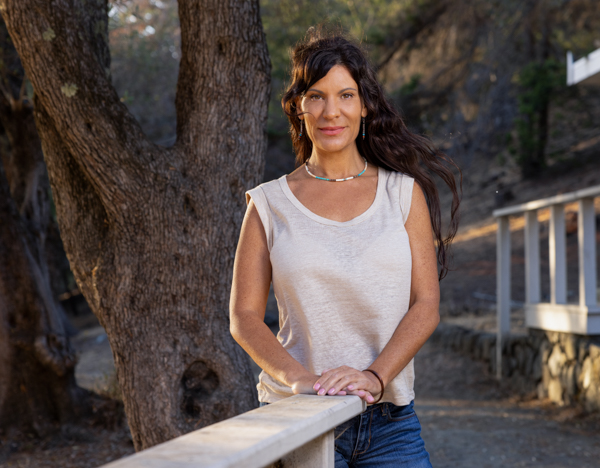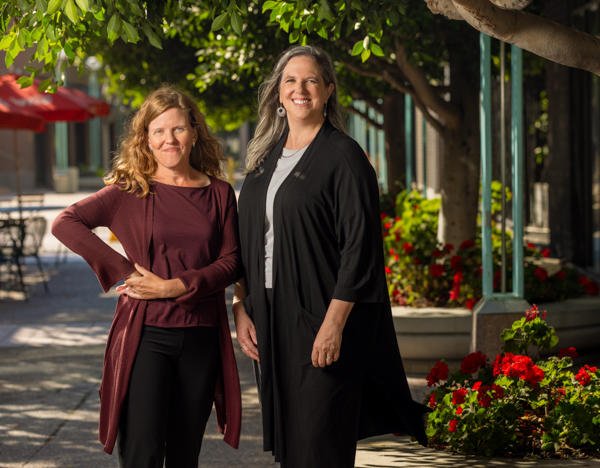
From Returning Wealth to Native Lands to Catalyzing the Employee Ownership Movement, Heinz Family Foundation Names Chrystel Cornelius, Hilary Abell and Alison Lingane Recipients of the 27th Heinz Awards for the Economy
Press Release
September 22, 2022
PITTSBURGH, September 22, 2022—The Heinz Family Foundation today named Chrystel A. Cornelius, president and CEO of Oweesta Corporation, and Hilary A. Abell and Alison Lingane, co-founders of Project Equity, recipients of the prestigious 27th Heinz Award for the Economy. As part of the accolade, Ms. Cornelius will receive, and Ms. Abell and Ms. Lingane will share, unrestricted cash awards of $250,000.
A member of both the Oneida Nation of Wisconsin and the Turtle Mountain Band of Chippewa Indians, Chrystel Cornelius grew up on a reservation in rural North Dakota that is designated as a persistent poverty area. Dedicated to the service of Native communities, Ms. Cornelius worked as a tribal planner writing grants and finding resources for everything from nursing homes to wind energy development. Later, seeing the need for fair loans and wealth-building, she founded Turtle Mountain CDFI (community development financial institution), the first nonprofit on her reservation and one of the few Native CDFIs to provide loans to Native people who were too often victims of predatory lending.
In 2011, Ms. Cornelius was named president and CEO of Oweesta Corporation, a Colorado-based CDFI intermediary offering financial products and development services exclusively to Native CDFIs and Native communities.
Centuries of genocide, dispossession of land, redlining and disenfranchisement of Native Americans have led to persistent and profound socioeconomic disparities for Native communities. With a mission of returning wealth to Native lands and people in the form of small business support, home loans, job opportunities and more, Oweesta provides the financial tools, training and capital to empower and help Native people control their economic destinies. Oweesta loans provide financing capital for Native CDFIs and other tribal or nonprofit loan funds. While it does not lend directly to individual borrowers, it offers training and technical assistance, including financial education to Native communities and Native CDFIs.
“As Native peoples, we have not forgotten the true history of this country; yet in the 530 years since colonization began, in many cases, America has,” says Ms. Cornelius. “Oweesta has acted as a conduit through our intermediary services to reclaim sovereignty efforts and has provided thousands of tribal members platforms for opportunity to acquire personal assets and retain community wealth. We innately know that when armed with the appropriate resources, Native peoples hold the capacity and ingenuity to ensure the sustainable, economic, spiritual and cultural well-being of their communities. Oweesta has been honored to walk hand in hand for over two decades with our Native communities to realize and redefine equity. Together.”
Over the past 20 years, Oweesta’s efforts have provided more than $60 million in loans and other investments to more than 8,500 Native individuals. Oweesta’s lending efforts have ultimately helped residents repair their credit, obtain loans to open new businesses and obtain assistance for home down payments. Oweesta has also certified thousands of trainers who have coached more than 40,000 community members in programs including its Building Native Communities curriculum. More recently, in 2021, Oweesta was designated a housing counseling intermediary by the U.S. Department of Housing and Urban Development to further increase homeownership on tribal lands.
“We honor Chrystel for her innovative approach to addressing the economic barriers, neglect and disenfranchisement that for centuries have stripped Native peoples of sovereignty and the ability to control their financial future,” says Teresa Heinz, Chairman of the Heinz Family Foundation. “Our country’s shameful legacy of exclusion has created profound need and limited the ability of many Native communities to access even the most basic financial services. Through Oweesta, Chrystel is removing those obstacles, empowering Native people with the economic resources to build financially strong families, strong communities and a brighter future.”
“We honor Chrystel for her innovative approach to addressing the economic barriers, neglect and disenfranchisement that for centuries have stripped Native peoples of sovereignty and the ability to control their financial future.”
— Teresa Heinz
Alison Lingane and Hilary Abell co-founded Project Equity in 2014 to advance their shared interest in creating better jobs and a fairer economy. Project Equity is a national leader in the movement to harness employee ownership to maintain thriving local economies, honor business owners’ legacies and reduce income and wealth inequality.
Ms. Abell and Ms. Lingane work with partners around the country to raise awareness about employee ownership as an exit strategy for business owners and as a proven approach for increasing employee engagement and well-being, and to build programs and policies to make it a preferred way of doing business. Project Equity helps companies transition to employee ownership, contracts with cities and counties to retain legacy businesses, and uses communications, public policy, capital strategies and ecosystem development to mainstream and scale employee ownership within the public and private sectors.
Ms. Lingane and Ms. Abell’s founding of Project Equity was timely, anticipating the ongoing wave of retirements by nearly 3 million baby boomer business owners, who collectively own more than half of all privately held businesses with employees, but who often have no succession plans.
“My life’s work has been about finding ways to scale access to opportunity, and at the core, this is what we founded Project Equity to do. With employee ownership, opportunity is built right into your job. Whether we talk about the decline of the middle class, stark disparities in pay levels and job quality by race, or the gap between wages and housing affordability, employee ownership can address all of these issues. It also preserves local jobs and businesses and helps them be more competitive, strengthening local economies,” said Ms. Lingane.
Ms. Abell added, “I’ve seen so many low-wage workers transform their lives when given the opportunity to share in business ownership through cooperatives, employee stock ownership plans and similar models. Our goal is to enable many, many more workers across the United States to develop their leadership and build financial resiliency by co-owning the companies where they work. My current passion is to engage policymakers to fully embrace and foster broad-based employee ownership and cooperatives, given their well-proven benefits for workers, businesses and society.”
To date, Project Equity’s team of more than 20 changemakers has educated 10,000 stakeholders about employee ownership, advised nearly 800 business owners and provided in-depth technical assistance to more than 85 companies on the path to employee ownership. Their work has resulted in workplaces where employees have professional opportunities, a voice and meaningful—often life-changing—financial benefits. One worker, a single mom, described her first profit-sharing check as “the biggest check I have ever received.” Another company shared over half a million dollars in profits with its more than 30 restaurant employees in the first two years after becoming employee-owned.
“Hilary and Alison have catalyzed a movement that is having transformative, multigenerational impact for workers, their families and their communities,” says Teresa Heinz, Chairman of the Heinz Family Foundation. “By creating tools to support the uptake of employee ownership and increasing awareness of this model, they are helping to create resilient companies where employees have agency, economic stability and the opportunity to build wealth by sharing in the profits generated by their hard work. In doing so, they reflect the vision of my late husband, Senator John Heinz, who advocated for an economy driven by enterprise, innovation and socially responsible business practices.”
When COVID-19 hit, Project Equity launched their public policy efforts in earnest, working at the state and federal levels to promote employee ownership as a recovery and resilience strategy. They co-founded a statewide coalition and model for employee ownership movement building, Worker-Owned Recovery California, which passed the California Employee Ownership Act (currently awaiting the governor’s signature). They also advised the U.S. Department of Commerce in the creation of its first Job Quality Toolkit, which incorporates employee ownership as a job quality strategy and was unveiled in August 2022. In 2021, Project Equity launched the Employee Ownership Catalyst Fund, which provides flexible capital to businesses pursuing employee ownership, and helps to bring more lenders and investors into the space.
“Hilary and Alison have catalyzed a movement that is having transformative, multigenerational impact for workers, their families and their communities.”
— Teresa Heinz
Created to honor the memory of the late U.S. Senator John Heinz, the Heinz Awards celebrate excellence and achievement in areas of great importance to Senator Heinz. The 27th awards bring the total number of recipients to 165 and reflect more than $30 million in awards given since the program was launched in 1993.
Additional recipients by category are:
Arts: vanessa l. german, Visual Artist and Founder, ARThouse, Pittsburgh, Pa., is a visual and performance artist whose assemblage sculpture, installations, spoken-word poetry and community-based work confront racism, violence, homophobia and hate, while simultaneously providing affirmation and optimism. A self-described “citizen artist,” she also provides spaces for collective healing and creative expression in Homewood, a Pittsburgh community acutely affected by disinvestment.
Arts: Cauleen Smith, Visual Artist, Los Angeles, Calif., is an interdisciplinary artist and educator whose experimental films, installations and multimedia works push the boundaries of film, blending moving images with painting, textiles and more to create immersive experiences. Drawing from structuralism, Third World Cinema and science fiction, Ms. Smith’s work reflects on history and the power of community and culture.
Environment: Anne C. Evens, Ph.D., CEO, Elevate, Chicago, Ill., works to ensure equal access to climate solutions that provide clean and affordable heat, power and water in homes and communities. Elevate champions energy efficiency improvements in affordable housing and manages programs that advance renewable energy, water conservation, lead abatement and indoor air quality, primarily in multifamily buildings.
Environment: Rhett Ayers Butler, Founder and CEO, Mongabay.org, Menlo Park, Calif., leads the global environmental science and conservation news platform Mongabay, which produces original reporting in 10 languages by over 800 correspondents across the world. Mongabay produces meticulously researched, evidence-based news and investigative pieces, and is a trusted source giving voice and agency to frontline communities and ecosystems facing threats from development and deforestation.
Recipients of the 27th Heinz Awards will be honored at a virtual event on October 25, 2022. For more information on the awardees, visit www.heinzawards.org.
# # #
About the Heinz Awards
Established by Teresa Heinz in 1993 to honor the memory of her late husband, U.S. Senator John Heinz, the Heinz Awards celebrate the accomplishments and spirit of the Senator by recognizing the extraordinary achievements of individuals in the areas of great importance to him. The Awards, administered by the Heinz Family Foundation, currently recognize individuals for their contributions in the areas of the Arts, the Economy and the Environment. Nominations are submitted by invited experts, who serve anonymously, and are reviewed by jurors appointed by the Heinz Family Foundation. The jurors make recommendations to the Board of Directors, which subsequently selects the Award recipients.
For more information on the Heinz Awards, visit www.heinzawards.org.
Contact: Maya Brod / 301-467-4917 / mbrod@burness.com

%20Joshua%20Franzos.jpg)
%20Joshua%20Franzos.jpg)